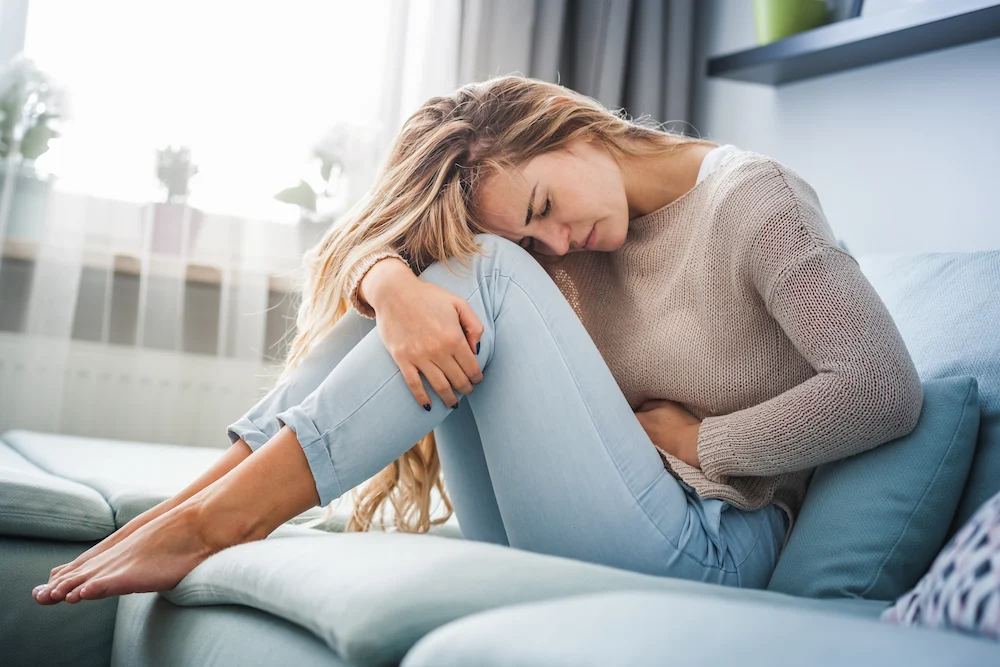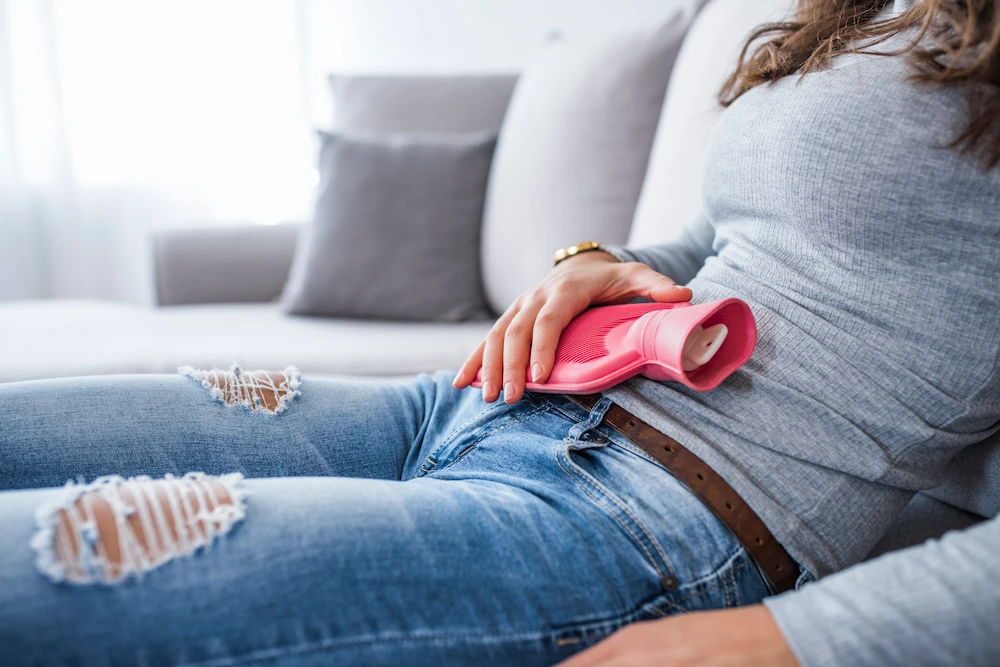Why Do I Have Cramps But No Period?

Menstrual cramps are a familiar discomfort for many women, often accompanying their monthly period. But what happens when those cramps strike without the usual bleeding? If you’re experiencing period cramps but no period, it’s natural to feel concerned and seek answers.
This comprehensive guide will delve into the various reasons why you might have cramps without a period, offering insights into potential underlying causes and empowering you to take control of your reproductive health.
Why Do I Have Cramps But No Period? Possible Causes
Cramps without a period can stem from a variety of factors, ranging from normal hormonal fluctuations to underlying medical conditions. Here are some common culprits:
- Ovulation: Mid-cycle pain, known as mittelschmerz, can occur during ovulation when an egg is released from the ovary. This pain is typically felt on one side of the lower abdomen and can range from a mild twinge to a sharp cramp.
- Pregnancy: Early pregnancy can sometimes cause mild cramping, often mistaken for period cramps. If you’re sexually active and have a missed period, consider taking a pregnancy test.
- Ovarian Cysts: Fluid-filled sacs on the ovaries can sometimes cause pelvic pain and cramping, even if you’re not menstruating.
- Endometriosis: This condition occurs when tissue similar to the lining of the uterus grows outside the uterus. It can cause pelvic pain, cramping, and heavy bleeding, sometimes even between periods.
- Pelvic Inflammatory Disease (PID): This infection of the female reproductive organs can cause pelvic pain, cramping, and abnormal vaginal discharge.
- Irritable Bowel Syndrome (IBS): IBS can cause abdominal cramps, bloating, and changes in bowel habits, sometimes mimicking menstrual cramps.
- Stress and Anxiety: Stress can affect your hormonal balance and muscle tension, potentially leading to cramps or abdominal discomfort.
Period Cramps But No Period: When to Seek Medical Advice
While occasional cramps without a period might not be a cause for concern, it’s important to consult a doctor if:
- Pain is severe or persistent
- You have other symptoms like fever, unusual discharge, or heavy bleeding
- You’ve missed multiple periods
- You’re concerned about a possible pregnancy

Does Tylenol Help with Cramps?
Yes, Tylenol (acetaminophen) can help relieve pain and reduce fever, but it doesn’t directly address inflammation.
Ibuprofen for Cramps: An Anti-Inflammatory Option
Ibuprofen is a non-steroidal anti-inflammatory drug (NSAID) that can help reduce pain and inflammation associated with cramps.
Best Medicine for Menstrual Cramps: Finding Relief
Over-the-counter pain relievers like ibuprofen or naproxen can be effective for managing menstrual cramps. If your pain is severe or doesn’t respond to OTC medications, your doctor might prescribe stronger pain relievers or hormonal birth control to help regulate your menstrual cycle.
Primary Care Doctor and Women’s Health
If you’re experiencing cramps without a period or have any concerns about your reproductive health, it’s important to consult with a primary care doctor or gynecologist. They can help you:
- Identify the underlying cause of your symptoms.
- Recommend appropriate treatment options.
- Provide guidance on managing your menstrual health.
Primary Care Doctor: Your Partner in Wellness
Your primary care doctor plays a crucial role in your overall health, including your reproductive health. They can provide preventive care, address your concerns, and coordinate your care with specialists if needed.
Key Takeaways:
- Cramps without a period can be caused by various factors, including ovulation, pregnancy, endometriosis, and other medical conditions.
- If you experience persistent or concerning cramps, consult a primary care doctor.
- Over-the-counter pain relievers like ibuprofen or naproxen can help manage cramps.
- Consider food sensitivity testing to identify potential food intolerances that might contribute to digestive discomfort.
Remember, this article is intended for informational purposes only and should not be considered a substitute for professional medical advice. If you have any concerns about your health or are experiencing menstrual cramps, consult a qualified healthcare professional.
FAQs: Why Do I Have Cramps But No Period?
- Is it normal to experience cramps without having my period? Occasional cramps without a period can be normal, especially if you’re ovulating or experiencing hormonal fluctuations. However, if the cramps are severe, persistent, or accompanied by other symptoms, it’s important to consult your doctor.
- Could my cramps be a sign of pregnancy, even if I haven’t missed my period yet? Yes, some women experience mild cramping in early pregnancy, even before their missed period. If you’re sexually active and experiencing cramps without a period, consider taking a pregnancy test.
- What are some home remedies for menstrual cramps? Applying heat to your lower abdomen, taking over-the-counter pain relievers like ibuprofen, and practicing relaxation techniques can help alleviate cramps.
- Can stress worsen menstrual cramps? Yes, stress can disrupt your hormonal balance and increase muscle tension, potentially making cramps more severe. Managing stress through techniques like exercise, yoga, or meditation might help.
Contact Us
Hiriart & Lopez MD, LLC
9950 SW 107th Ave STE 101,
Miami, FL 33176
305-274-8779
Phone: (305) 274-8779
Fax: (305) 274-0646
OPENING HOURS
Monday 7:30 AM–4:30 PM
Tuesday 7:30 AM–4:30 PM
Wednesday 7:30 AM–4:30 PM
Thursday 7:30 AM–4:30 PM
Friday 7:30–11 AM
Saturday Closed
Sunday Closed
OFFICE LOCATION
Why Do I Have Cramps But No Period?

Menstrual cramps are a familiar discomfort for many women, often accompanying their monthly period. But what happens when those cramps strike without the usual bleeding? If you’re experiencing period cramps but no period, it’s natural to feel concerned and seek answers.
This comprehensive guide will delve into the various reasons why you might have cramps without a period, offering insights into potential underlying causes and empowering you to take control of your reproductive health.
Why Do I Have Cramps But No Period? Possible Causes
Cramps without a period can stem from a variety of factors, ranging from normal hormonal fluctuations to underlying medical conditions. Here are some common culprits:
- Ovulation: Mid-cycle pain, known as mittelschmerz, can occur during ovulation when an egg is released from the ovary. This pain is typically felt on one side of the lower abdomen and can range from a mild twinge to a sharp cramp.
- Pregnancy: Early pregnancy can sometimes cause mild cramping, often mistaken for period cramps. If you’re sexually active and have a missed period, consider taking a pregnancy test.
- Ovarian Cysts: Fluid-filled sacs on the ovaries can sometimes cause pelvic pain and cramping, even if you’re not menstruating.
- Endometriosis: This condition occurs when tissue similar to the lining of the uterus grows outside the uterus. It can cause pelvic pain, cramping, and heavy bleeding, sometimes even between periods.
- Pelvic Inflammatory Disease (PID): This infection of the female reproductive organs can cause pelvic pain, cramping, and abnormal vaginal discharge.
- Irritable Bowel Syndrome (IBS): IBS can cause abdominal cramps, bloating, and changes in bowel habits, sometimes mimicking menstrual cramps.
- Stress and Anxiety: Stress can affect your hormonal balance and muscle tension, potentially leading to cramps or abdominal discomfort.
Period Cramps But No Period: When to Seek Medical Advice
While occasional cramps without a period might not be a cause for concern, it’s important to consult a doctor if:
- Pain is severe or persistent
- You have other symptoms like fever, unusual discharge, or heavy bleeding
- You’ve missed multiple periods
- You’re concerned about a possible pregnancy

Does Tylenol Help with Cramps?
Yes, Tylenol (acetaminophen) can help relieve pain and reduce fever, but it doesn’t directly address inflammation.
Ibuprofen for Cramps: An Anti-Inflammatory Option
Ibuprofen is a non-steroidal anti-inflammatory drug (NSAID) that can help reduce pain and inflammation associated with cramps.
Best Medicine for Menstrual Cramps: Finding Relief
Over-the-counter pain relievers like ibuprofen or naproxen can be effective for managing menstrual cramps. If your pain is severe or doesn’t respond to OTC medications, your doctor might prescribe stronger pain relievers or hormonal birth control to help regulate your menstrual cycle.
Primary Care Doctor and Women’s Health
If you’re experiencing cramps without a period or have any concerns about your reproductive health, it’s important to consult with a primary care doctor or gynecologist. They can help you:
- Identify the underlying cause of your symptoms.
- Recommend appropriate treatment options.
- Provide guidance on managing your menstrual health.
Primary Care Doctor: Your Partner in Wellness
Your primary care doctor plays a crucial role in your overall health, including your reproductive health. They can provide preventive care, address your concerns, and coordinate your care with specialists if needed.
Key Takeaways:
- Cramps without a period can be caused by various factors, including ovulation, pregnancy, endometriosis, and other medical conditions.
- If you experience persistent or concerning cramps, consult a primary care doctor.
- Over-the-counter pain relievers like ibuprofen or naproxen can help manage cramps.
- Consider food sensitivity testing to identify potential food intolerances that might contribute to digestive discomfort.
Remember, this article is intended for informational purposes only and should not be considered a substitute for professional medical advice. If you have any concerns about your health or are experiencing menstrual cramps, consult a qualified healthcare professional.
FAQs: Why Do I Have Cramps But No Period?
- Is it normal to experience cramps without having my period? Occasional cramps without a period can be normal, especially if you’re ovulating or experiencing hormonal fluctuations. However, if the cramps are severe, persistent, or accompanied by other symptoms, it’s important to consult your doctor.
- Could my cramps be a sign of pregnancy, even if I haven’t missed my period yet? Yes, some women experience mild cramping in early pregnancy, even before their missed period. If you’re sexually active and experiencing cramps without a period, consider taking a pregnancy test.
- What are some home remedies for menstrual cramps? Applying heat to your lower abdomen, taking over-the-counter pain relievers like ibuprofen, and practicing relaxation techniques can help alleviate cramps.
- Can stress worsen menstrual cramps? Yes, stress can disrupt your hormonal balance and increase muscle tension, potentially making cramps more severe. Managing stress through techniques like exercise, yoga, or meditation might help.
Contact Us
Hiriart & Lopez MD, LLC
9950 SW 107th Ave STE 101,
Miami, FL 33176
305-274-8779
Phone: (305) 274-8779
Fax: (305) 274-0646
OPENING HOURS
Monday 7:30 AM–4:30 PM
Tuesday 7:30 AM–4:30 PM
Wednesday 7:30 AM–4:30 PM
Thursday 7:30 AM–4:30 PM
Friday 7:30–11 AM
Saturday Closed
Sunday Closed

